All Power Books, a West Adams resource in tough times, faces its own uncertain future
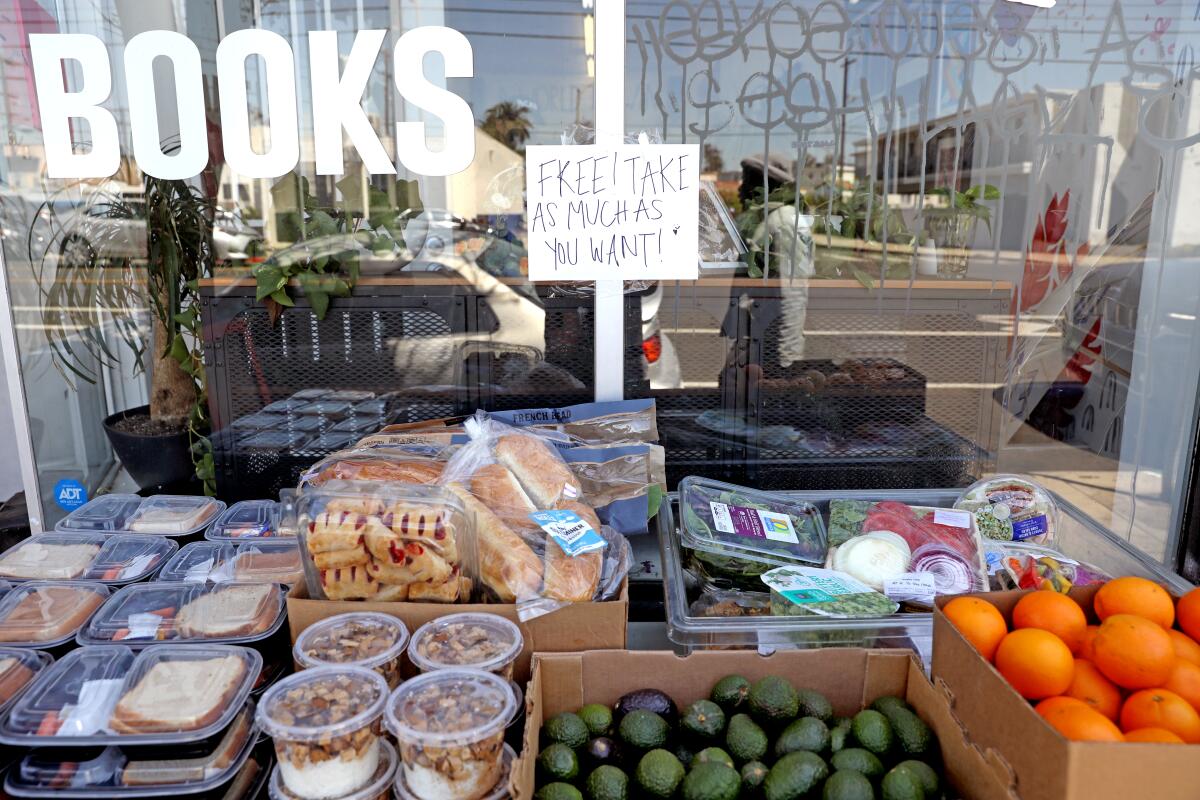
- Share via
Kevin Troy Swett filled a plastic bag with frozen meats and yogurt from a community fridge overflowing with produce. From the free pantry adjacent to it, he grabbed masks, wet wipes, a Lipton iced tea, a flashlight and batteries.
It was an April afternoon, and Swett, 54, was paying his weekly visit to All Power Books — a cooperative bookstore, art space and community center in the historic West Adams district. Next to shelves displaying books about socialism and communism were boxes of donated food — avocados, pastries, fruit — laid out on tables along the wall.
A few months ago, Swett, a Marine veteran who lives across the street, started visiting the bookstore to browse its free clothing rack and pick up essentials. It has since become integral to his life; the shop’s organizers have even handed him cash to buy medications.
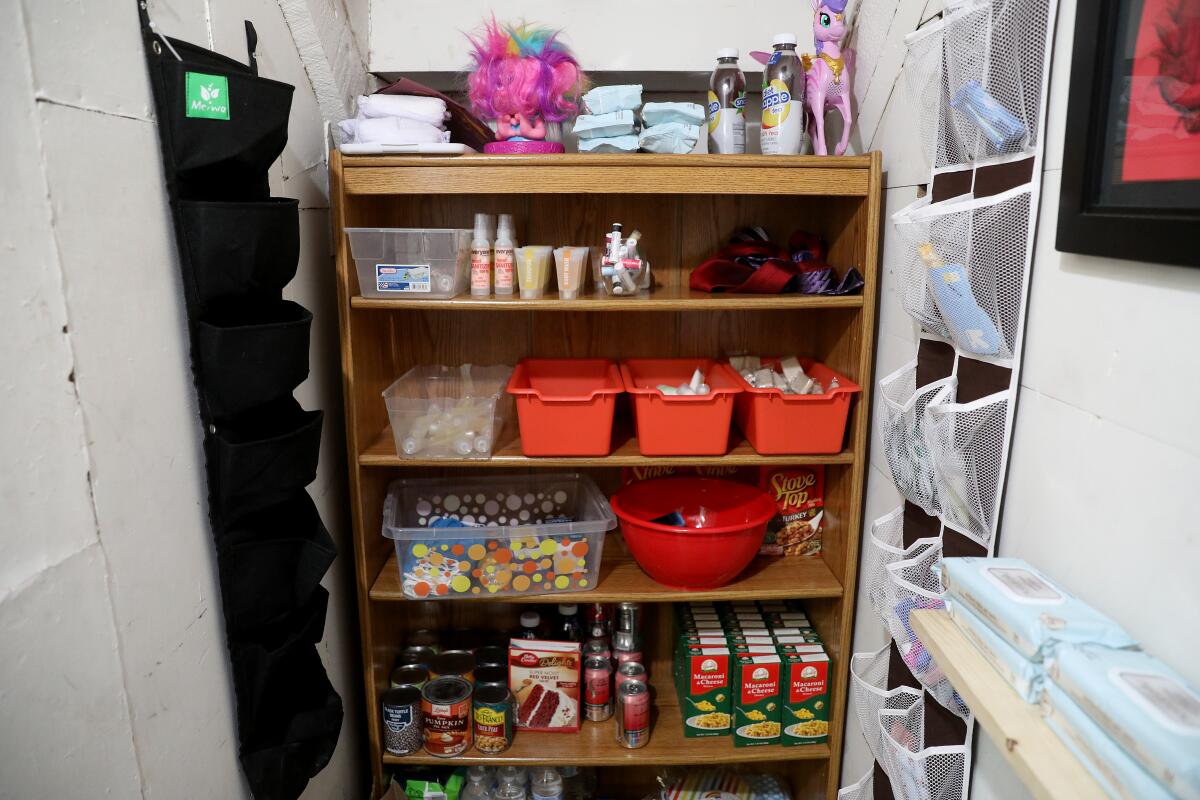
Swett was less worried about his own needs that day than he was about the unique hybrid storefront he had come to rely on. “This place is awesome,” he said, “and it needs help.”
All Power Books is more than a bookstore: It’s a volunteer-run, community-supported radical space committed to helping its neighbors. Its services include — for a start — a free store with food, toiletries, cleaning supplies, menstrual products and books; access to a computer and printer with free Wi-Fi; a restroom open to all; resources on worker and tenant rights; a biweekly community clinic; and a space for other activists to meet. The organizers have also distributed free bicycles and school supplies, driven locals to DMV or doctor appointments, raised money for specific individual needs (from vans to cellos) and offered babysitting — free of charge.
“We are by the people, for the people,” said co-founder and co-organizer Savannah Boyd.
It’s the kind of place many Angelenos might be surprised exists at all — and indeed, its existence is precarious. Last month, the organizers learned their lease would not be renewed; the nearly 100-year-old mixed-use building needs major renovations. They will be there at least until the end of May before possibly moving to a new, smaller location next door.
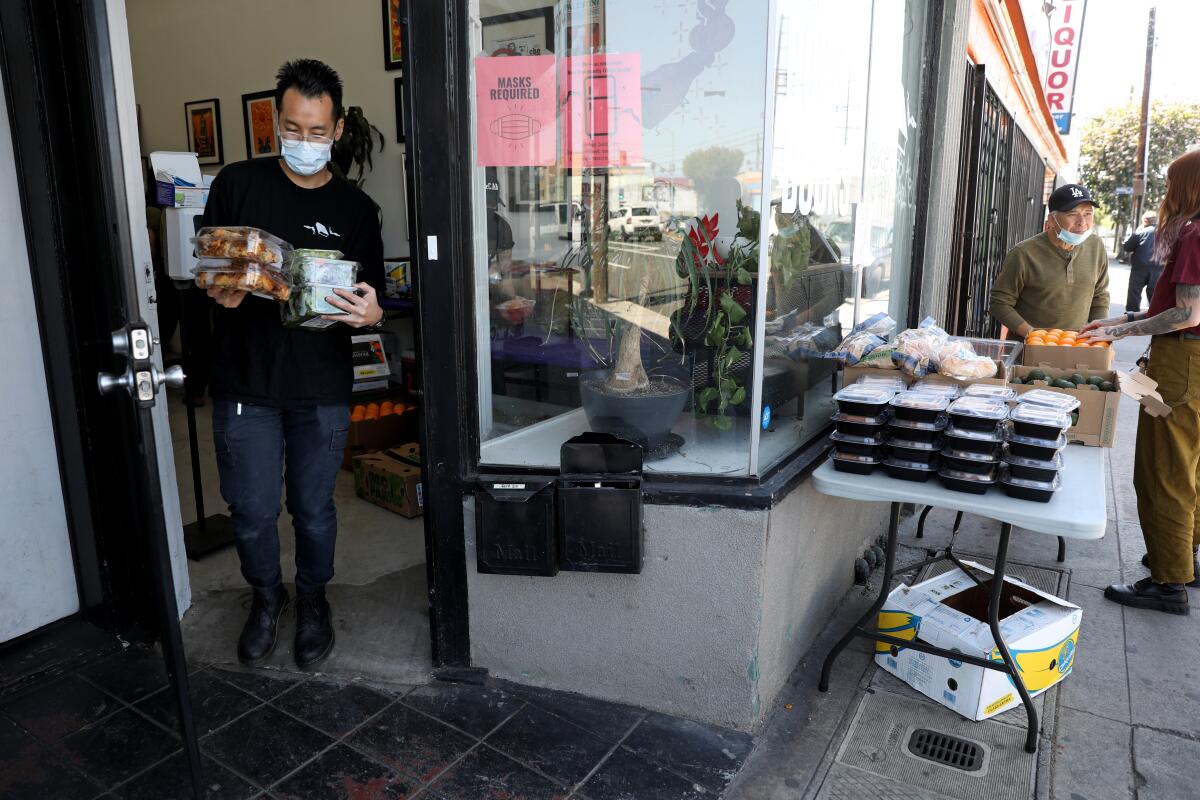
The booksellers acknowledge the building is in bad shape. Just a few weeks ago, a water heater from an empty upstairs unit leaked water into the shop below, damaging up to $2,000 in equipment and merchandise. If construction permits are approved, repairs will include the installation of a new beam and footing pads and restoration of the building’s foundation, according to the city’s building and safety website.
The building owners are proposing a rent reduction during construction and, afterward, a new, three-year lease with a 38% rent bump followed by 3% annual increases, according to an email the property manager sent All Power. The organizers are filing a counterproposal with one year at their current rate and a 20% rent bump with no annual increases, among other things. In any event, they have already signed a lease for the space next door.
Word of a rent increase is nothing new in West Adams. The organizers fear it will perpetuate the area’s accelerating gentrification and endanger spaces like All Power that serve longtime residents as part of their mission.
“This isn’t necessarily about All Power, it’s about what happens to these places, these neighborhoods as a whole,” said co-founder Jesse Barnett. “Why it feels so wrong in this instance is because we’re one of the only things in the neighborhood that is solely giving back.”
The building’s property manager did not respond to a request for comment.
One of L.A.’s oldest neighborhoods, West Adams is a working- and middle-class neighborhood that has risen in popularity over the years, becoming a hot spot for young newcomers and developers. Today there are dozens of new building projects in various stages of construction. Familiar businesses are disappearing to make room for new ones; longtime residents are being priced out of their homes.
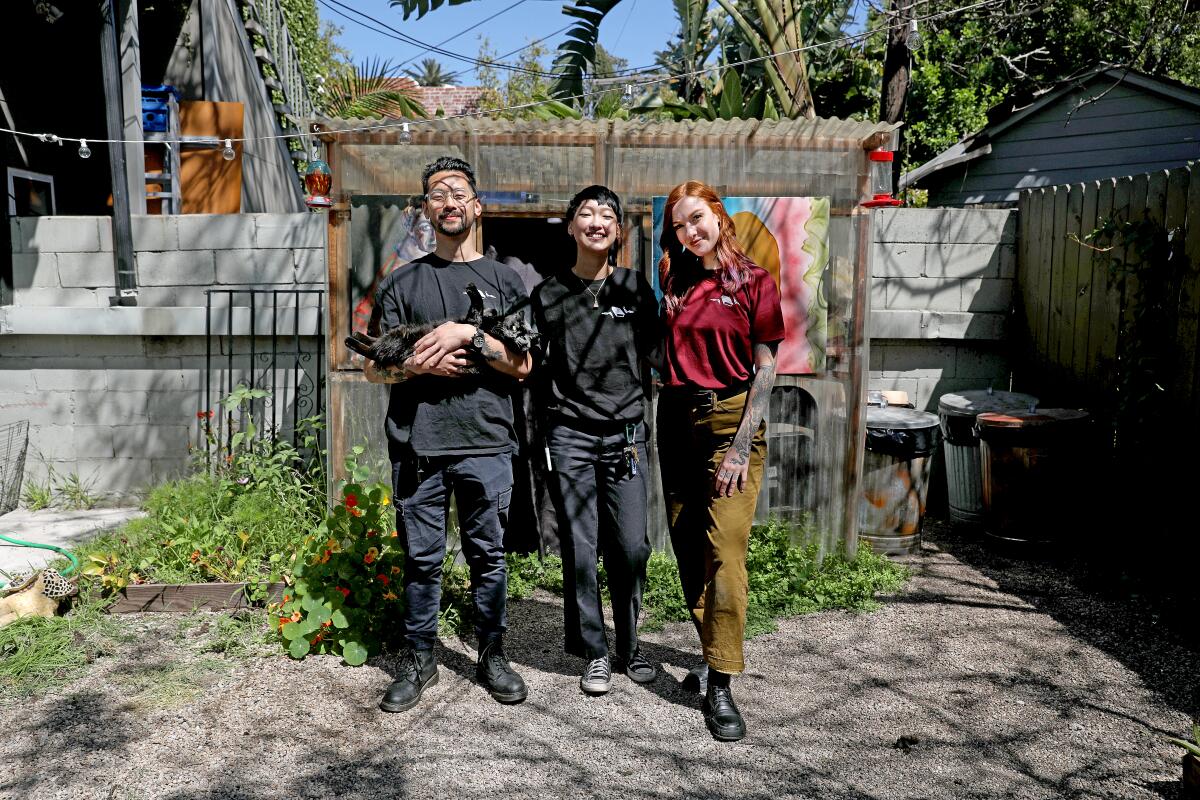
When the COVID-19 pandemic began tearing through L.A., these growing socioeconomic disparities were amplified.
“During the pandemic was when the veil came off, and we all saw that a lot of things don’t work as they’re supposed to,” said co-organizer Gage Nguyen.
As the city’s most fortunate workers narrowed their orbits to home offices, volunteers fanned out to provide mutual aid across the city — mostly at encampments. All Power’s future organizers were among them, and that’s how they met.
“We were just talking to people, and if they said that they needed something, we would do our absolute best to provide that for them,” said Barnett. Often that meant supplying them with food, toiletries or tents; sometimes it was helping them fill out their stimulus check paperwork.
Barnett, Boyd and others eventually realized the community needed a permanent space to go to for help.
In June 2021, they opened that space, between a barbershop and a market liquor, and called it All Power Books. It’s now run by six friends — musicians, activists, graphic designers, nonprofit workers — who spend their free time giving back to the community. (Co-organizers also include Catherine Quach and Andrew Muro.)
The business operates on an anticapitalist model, said Boyd. Among the goods they do sell are mugs, sweatshirts and tote bags, along with books by Malcolm X, Angela Davis, Vladimir Lenin and other radical thinkers. Sales pay for the shop’s rent, free goods and services. “We don’t keep a single penny of the profit for us.”
In a country that has trouble even dealing with a shortage of baby formula, All Power is a stopgap in the absence of a safety net.
“It incenses me that it takes six people who are just trying to live their own lives, keep roofs over their own heads, to have to pick up the slack of a city, one of the richest in the nation, who can’t provide these things for people,” said Barnett, recalling a mother who recently walked into the store worried she couldn’t feed her children.
“We don’t do any of this because we’re like, ‘Oh we feel people would benefit off of this,’” added co-organizer Kai Nguyen. “It’s them telling us, ‘I could really use help with this, I could really use help with that.’”
Comedian Tuesday Thomas has lived in All Power’s building for eight years. In the short time the shop has been open, she’s noticed a positive change in the neighborhood.
“These guys here,” she said, pointing to some of the locals hanging out inside the store, “are a lot calmer than when I first met them.” She’d often see them angry and fighting. But now, “they come in here and they talk to somebody, and these people listen to them,” she said. That has made all the difference.
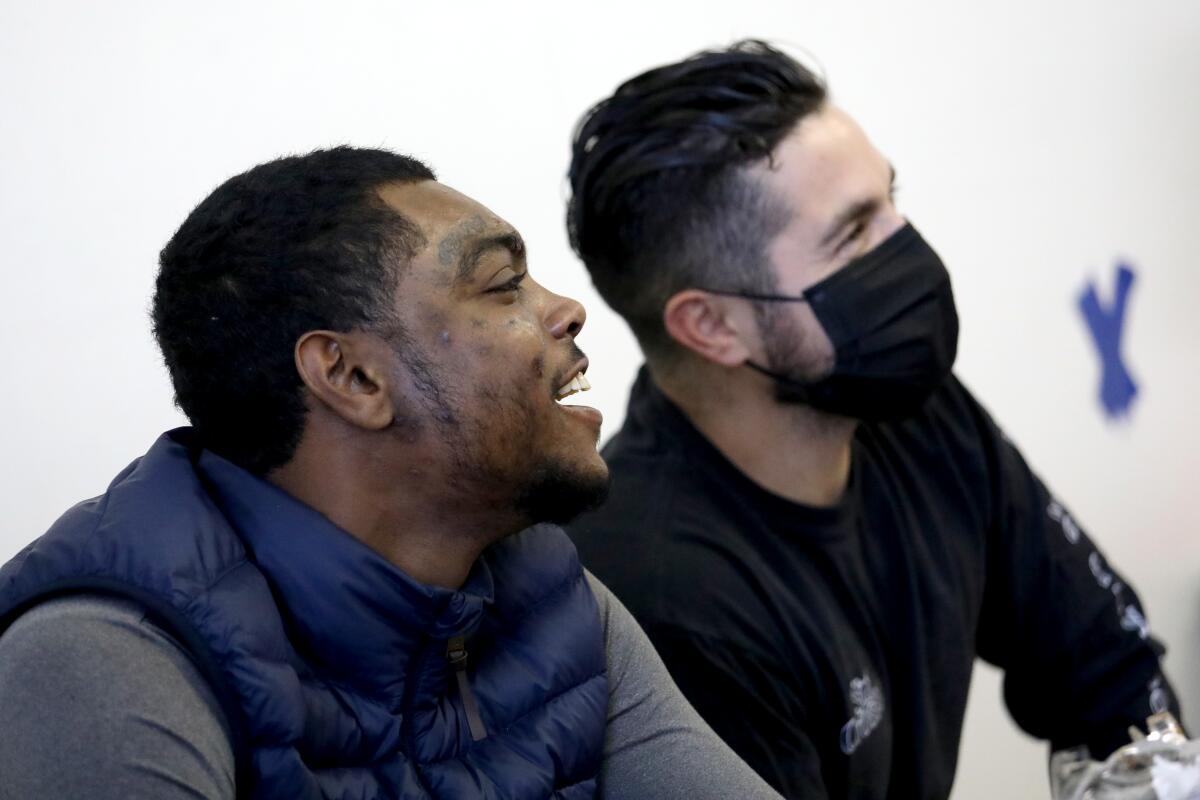
Damien Harripersad agrees. The 25-year-old local has been coming into the shop nearly every day since it opened. “I read, I hang out. It’s just peaceful,” he said on a recent afternoon, munching on chicken he’d gotten from the shop. A Palestinian flag and framed images of Che Guevara and the slogan “Destroy the patriarchy” hung close by.
“It’s the most go-to spot around,” he added.
Harripersad has come to rely on the bookstore for essentials: groceries, diapers for his friend’s kid and even clothes for himself. The day he spoke to a Times reporter he was wearing jeans, a long-sleeve shirt and a pair of sneakers he’d scored from the free clothing rack.
Damien Jr. is also a frequent visitor. After a long, tiring day at work, Harripersad drops off his 5-year-old son at the shop so he can take a shower and catch up on house chores. Others in his building are also daily visitors.
“If this place closed, it would put a lot of people in a bad place,” he said.
Kai Nguyen was there to reassure him that, store or no store, they’d find a way. “Anyone who needs help, we will help them,” Kai said. “That’s an ethos that we’ve kept this entire time.”
More to Read
Sign up for our Book Club newsletter
Get the latest news, events and more from the Los Angeles Times Book Club, and help us get L.A. reading and talking.
You may occasionally receive promotional content from the Los Angeles Times.










